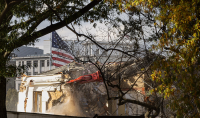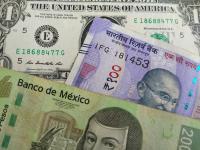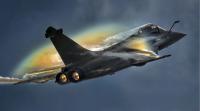
Global financial markets were in turmoil on Thursday in a clear sign that investors had not expected Russian President Vladimir Putin to make an aggressive move into Ukraine by launching a full-scale invasion.
“Even just yesterday people were dismissing this as unlikely,” well-known economist and Fed watcher Mohamed El-Erian, advisor at the Allianz & Gramercy said. “This is way beyond anything. This is a very unsatisfactory situation.”
European equity markets were sharply lower at lunchtime, while commodity prices surged, adding further upward pressure on inflation. Gold traded just below 2000 dollars per ounce, near a one-year high, while Brent oil futures rose above 100 dollars per barrel. Bond markets saw declining bond yields by lunchtime as central banks face a monetary policy struggle.
“Heightened volatility on the escalation of the conflict shows markets had not fully priced in the likelihood of deeper conflict,” Mark Haefele, Chief Investment Officer Global Wealth Management at Swiss bank UBS AG, said in a note to investors.
El-Erian sees ‘an incredibly volatile time’
Speaking on CNBC television, El-Erian presented a scenario with lower global growth and higher inflation. “There is a wide range of potential outcomes. This has to be priced into markets. It is going to continue to be an incredibly volatile time as the market tries to figure out what happens next.”
El-Erian said Russia’s move presents “a major stagflational blow” to the global economy at a time when central banks do not have the ability to react. “This takes 50bp completely off the table. It takes the expected eight or nine hikes (by the Federal Reserve, ed.) off the table. It means the Fed will have to tolerate higher inflation. No one wanted to be here.”
‘Commodities as a geopolitical hedge’
UBS advised its clients to keep their portfolios diversified, to use commodities as a geopolitical hedge, to position for dollar strength and to pick companies that can benefit from global growth.
“We think it is important for investors to maintain a calm stance and keep a broad perspective, and to build a portfolio robust enough to navigate the Ukraine crisis and rising US interest rates,” Heafele said. “Historically, the greatest risk for investors from geopolitical crises has come from overreacting and under-diversifying.
“The surge in uncertainty could be a major shock to equity and other risk markets such as credit,” wrote Holder Schmieding, Chief Economist at German private bank Berenberg. “The European economy could suffer a significant setback. Negative shocks to business and consumer confidence as well as even higher energy prices and thus inflation would dampen growth near-term.”
Stagflation risk
Other analysts say the big risk for the EU is that the combination of rising inflation and a recession could lead to a period of stagflation, which led to company closures, mass layoffs and very high interest rates in the 1980s.
Philippe Gijsels, chief strategist of BNP Paribas Fortis, has made his portfolios and mandates more defensive. He has increased his exposure to US Treasuries and is very slightly overweight in equities, basically neutral.
“Frankly, I am surprised by Putin’s action. I did not expect this and may have been a bit too positive. However, the main reason for the volatility in the market is still the fact that the central banks are going to tighten. They hate uncertainty, but I think the peak of that uncertainty is now behind us. I really can’t imagine that Putin would go further and attack a NATO member state,” said Gijsels.
Shock reaction
Luc Aben, chief economist at Van Lanschot Kempen, said: “The shock reaction of investors to situations like the current one is often fierce, but usually short-lived. Provided the situation does not get dramatically out of hand, investors eventually pick up the thread of economic fundamentals.”
‘Despite the geopolitical uncertainty, we are keeping our investment policy unchanged at the moment,” Aben said. “In a diversified portfolio, this means a slightly higher weighting in equities than usual. In bonds, we invest less than in a neutral scenario and also keep interest rate sensitivity rather moderate.’
Not going all-in
Maxim Gilis, portfolio manager at Belgium’s Econopolis, remains positive on equities but is not going all-in. “We have not done so in recent weeks because the situation is difficult to predict. We will probably buy very gradually in the coming days until we have more clarity.”
Sebastiaan Grenné, strategist at Argenta, has become more cautious after the first invasion of the renegade provinces and reduced the equity weighting to the neutral position in the mixed portfolio. “Rising inflation is making markets increasingly volatile. We are not buying up for the time being and are waiting to see what happens.”
German private bank Hauck & Aufhauser noted a dramatic increase in the risk premium for doing business in Russia, as reflected by a surge to 600 basis points in the Russian credit default spread, or CDS, with five-year senior US dollar notes, compared to 200 basis points yesterday. Moscow’s MOEX stock market index was down 38 percent.
This article was updated to reflect market reactions during the morning. Jurgen Vluijmans at InvestmentOfficer.be contributed to this story.
Related stories on Investment Officer Luxembourg:















